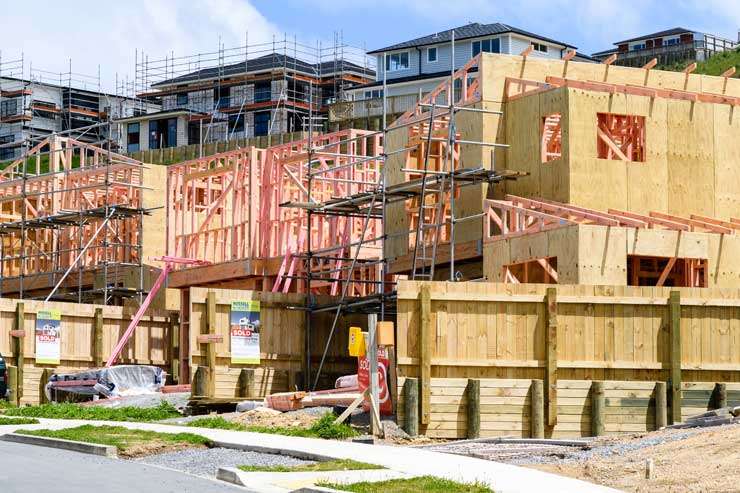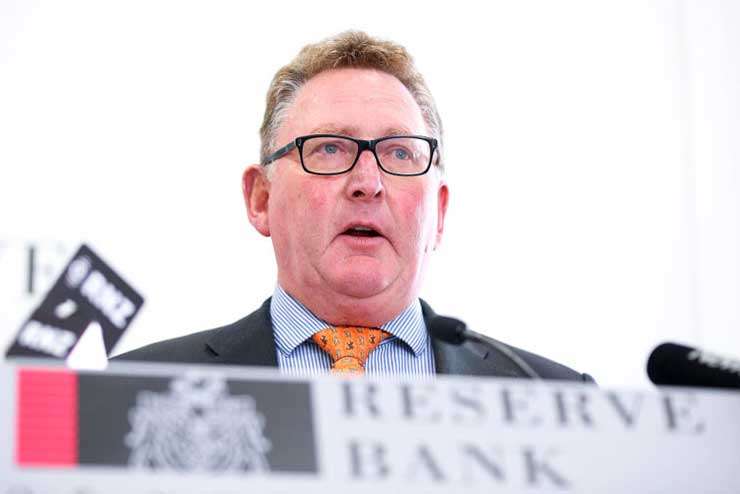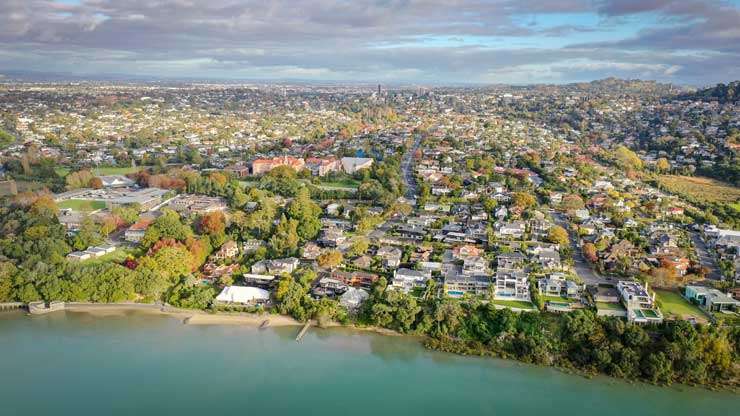Anything from modest house price rises to modest price drops are predicted by a range of industry experts for next year’s housing market after a year of interventions by the Government and Reserve Bank.
Measures included the targeting of investors – the Brightline test was extended from five to 10 years (though new builds were exempt), while investors were told they could no longer offset interest on loans for residential properties as an expense against the income they receive from those properties.
The Reserve Bank also brought back loan-to-value ratio restrictions, requiring investors to have a 40 per cent deposit as opposed to the 20 per cent for others.
Nick Goodall, head of research for CoreLogic, says the last 12 months have been a year of “property politics”.
Start your property search
“It's just been regulation after regulation, by either the Reserve Bank or the Government itself.”
While the previous year has seen exceptional growth, aided by available credit and low interest rates, that meant more unaffordability, which has led to more intervention.
But the fact that interest rates have started to lift means demand will likely reduce because people won’t be able to borrow the amount of money they need to buy a property.
Goodall says prices might still grow but the rate of growth will be slower, and he says there should be less intervention in the year ahead.
“Both the Government and the Reserve Bank should be able to sit back and see how this plays out.”
Michael Gordon, acting chief economist for Westpac, thinks the market could flatten and prices even fall a little next year.
The last 12 months have made clear the effect of interest rates on the housing market, he says.

CoreLogic head of research Nick Goodall: “It's just been regulation after regulation.” Photo / Supplied
“Our approach to housing forecasting has long emphasised interest rates in terms of explaining house price changes.
“That's not always been widely accepted. A lot of people push the idea that this is a housing supply issue - I say the experience of the last year surely demonstrates it's been a product of interest rates, not supply.”
Home building has been at record levels, with population growth down dramatically due to the migration tap being turned off, yet there was still a 30 per cent rise in house prices, he says.
All the measures to push prices down have only had a small impact – even making mortgage payments no longer deductible from taxable income has not been as significant as he thought it would be.
However, the exemption rule for new builds may mean investor activity has simply been diverted into that area.
There may be a split market ahead, where demand for new builds exceeds demand for existing homes, he says. But with mortgage rate rises even in the shorter fixed terms he expects a significant slowing in house price growth in the next six months - with that turning to modest price declines by late next year.
And while two or three per cent rises are not a big deal in themselves – it would take years to reverse the last six months of house price gains – they have a wider effect on spending patterns, which would move from rapid increases in household wealth to a flat environment.

New homes under construction in Wellington at the end of last year. Photo / Getty Images
“That would make a meaningful difference in terms of consumer spending, which is the majority of the economy.”
James Wilson, head of Valuation for OneRoof’s data partner Valocity, also says interest rates have been the biggest driver of the market this year.
Those with assets are richer on paper, he says, but those without assets are finding it even tougher to acquire one.
Reserve banks around the world had to make some fast decisions to stave off the economic consequences of Covid, and keeping up people’s ability to spend was probably the best decision initially.
But interest rate rises are on their way and will have the biggest impact on the market next year, with homeowners already pressing pause on moving and listings the lowest they have been for years.
Wilson expects the shortage to continue and activity remain low but growth levels of between five and 10 per cent could continue.
He, too, points to new distortions in the market, such as “massive demand” for new builds, especially with investors now eyeing them.
But the supply and demand mismatch will continue and that’s a fundamental reason for the strong house price growth over the past 14 years, he says.
Agency heads say the year has taught them lessons about resilience despite uncertainty.
Mike Bayley, managing director of Bayleys Real Estate, says the market quickly adapted to Covid and technological advances have been rapidly accelerated.
Online auctions are now well accepted and utilised – a record 16,730 viewers “tuned in” to Bayleys auctions in October.
Unsatisfied demand has been a feature of the market for the past 12 months and Bayleys’ national clearance rates have been at record levels of close to 80 per cent over the past three months.
Auctions have been brought forward regularly, sometimes resulting in further price increases in the hundreds of thousands of dollars.

This waterfront home in the Coromandel attracted more than 200 bids at auction and sold for just over $6m. Photo / Supplied
A large house with its own jetty on the Whitianga Waterway on the Coromandel resulted in an extra $2.2m for the vendor – more than 200 bids pushed the final sale price from the reserve of $3.8m to $6.03m, Bayley says.
His company would rather see a more manageable and sustainable rate of price growth in the year ahead, rather than the large increases being seen not just here but worldwide, he says.
The Reserve Bank’s OCR measures to control inflation will likely have the most impact on pegging back price increases for the next year or so, and Bayley believes the swing towards off-the-plan homes by first home buyers and investors will continue.
That sector is seeing a lot of activity in the sector, with Bayleys marketing over 70 off-the-plan residential developments across New Zealand.
However, supply pressures on construction timetables, material and labour shortages, rising land and building costs and “suffocating” bureaucracy around consent processes are being exacerbated by lockdown disruptions.
The combination of those factors means it’s likely to be some time before supply catches up with demand.
“While the Government won’t want to hear this, it also means the price of new housing will likely continue to increase for some time yet.”
Bryan Thomson, managing director of Harcourts, says the one thing that stands out for him is the resilience of the human spirit.
“If you look at the challenges we faced since Covid first hit, , there were all sorts of people who should have known better - probably including myself, to be honest - who wondered what would happen both to the economy and particularly to the real estate market.
“We've been shown once again, not just in New Zealand but around the world in general, the value people place on property and finding a way to continue their lives no matter what the challenges are.”
The Covid era began with an excess of demand, very low unemployment and extremely low interest rates.

Reserve Bank Governor Adrian Orr has signalled further interest rate rises. Photo / Getty Images
“Throw in on top of that the availability of both cash and finance, due to the actions of central banks right around the world, it shouldn't surprise anyone that we've seen an escalation in prices.”
He expects next year to be positive for the market, saying there is construction development underway to meet supply. However, building is not easy with issues such as the supply of raw materials and infrastructure costs so the catch-up won’t be in the short-term.
But employment will stay strong and that gives people confidence to invest, he says. Even if interest rates sneak up, New Zealanders enjoy investing in real estate, most of the time for the accommodation needs of family but also to prepare for retirement.
Peter Thompson, managing director of Barfoot & Thompson, says while the rise in prices is causing regulators and commentators concern, the market has not been experiencing anything very different to what is happening in other many countries with similar economies.
The drivers are the availability of low-cost mortgage finance, modest investment returns, housing supply over many years not meeting demand, the shortage of land to build on, and labour and material costs pushing up prices.
“The rate at which prices are increasing is slowing but not as fast as those placing restrictions on house buying would like.”
Thompson expects mortgage rates to increase in the year ahead and supply to improve as more properties either consented or under construction come on the market.
“These factors will continue to slow the rate at which prices rise but they will still likely rise.”

Remuera in central Auckland. House prices in the suburb have surged post-Covid. Photo / Chris Tarpey
Steve Koerber, one of Ray White Remuera’s top agents, says there will be a “sideways” market, saying escalating prices just can’t be sustained.
“In Remuera the median sale price in the middle of 2019 was $1.4m and today it's $2.8m. I didn't think things would double in that two-year period.
“I think the median price will just go sideways for the next 12 months, you know, up down, up down, up down, a sideways market - it has to be.”
But Kiwis do love real estate, he says. They are also pretty smart and know property is a great hedge against inflation so the wealthy and smart people he knows have become collectors and holders of assets which they have benefited from.
“If they'd left their money in cash they'd be stuffed. To me that's the overriding theme and driver of the market and the last two years.”
But mortgage broker Rupert Gough, founder of The Mortgage Lab, thinks many people will find it harder to get finance.
“We’re all about the availability of finance and how that affects the market. I think New Zealand as a whole has under-estimated how much that finance is going to tighten in the next 12 months.”
That will curb enthusiasm in the market.
“I'm not saying there will be a crash but my guess would be in the next 12 months we’ll be plus or minus five per cent from where we are in October, November this year. To get a mortgage as of now, though, you are going to have to be super-clean. We're going to look back and think how easy it was to get a mortgage previously.”









































































